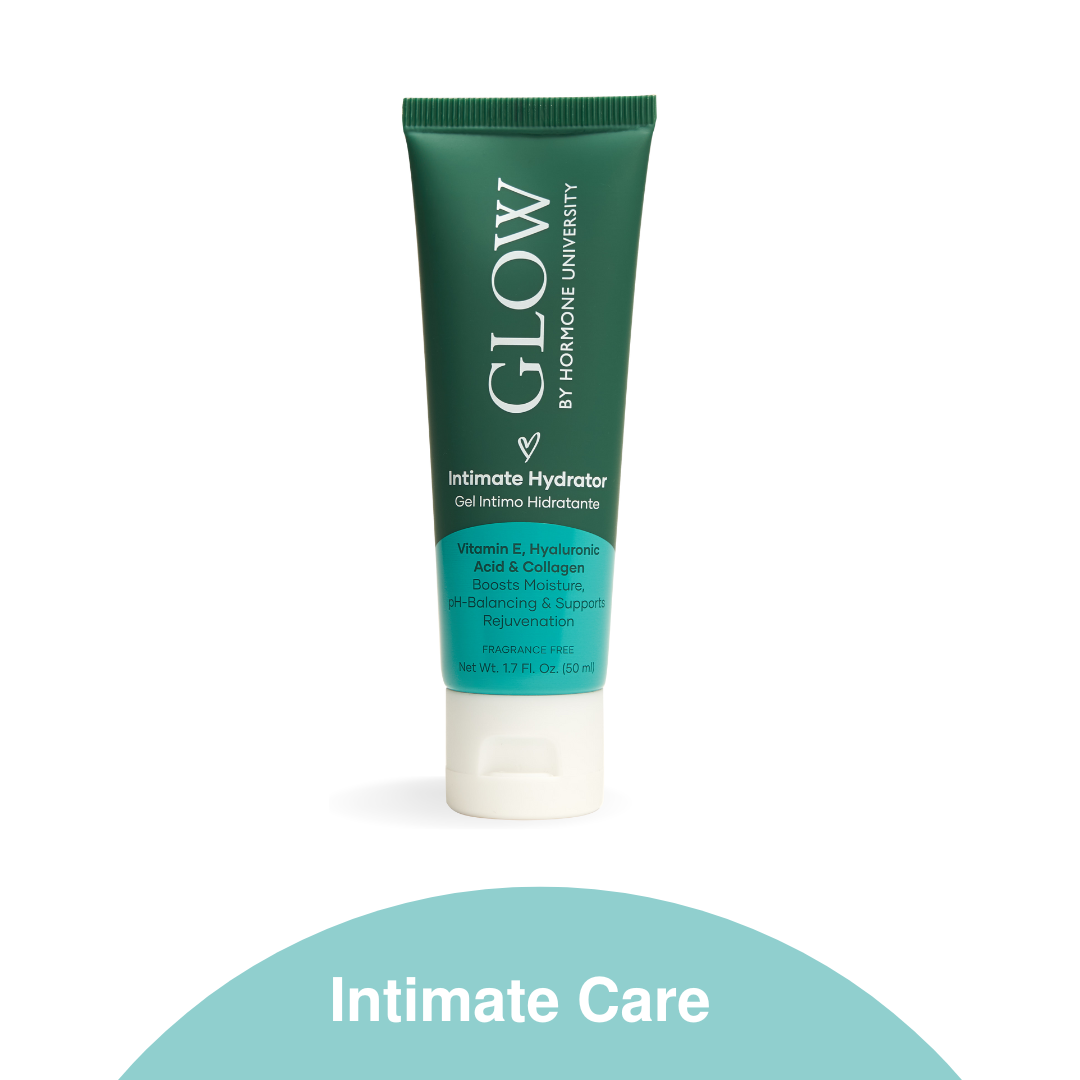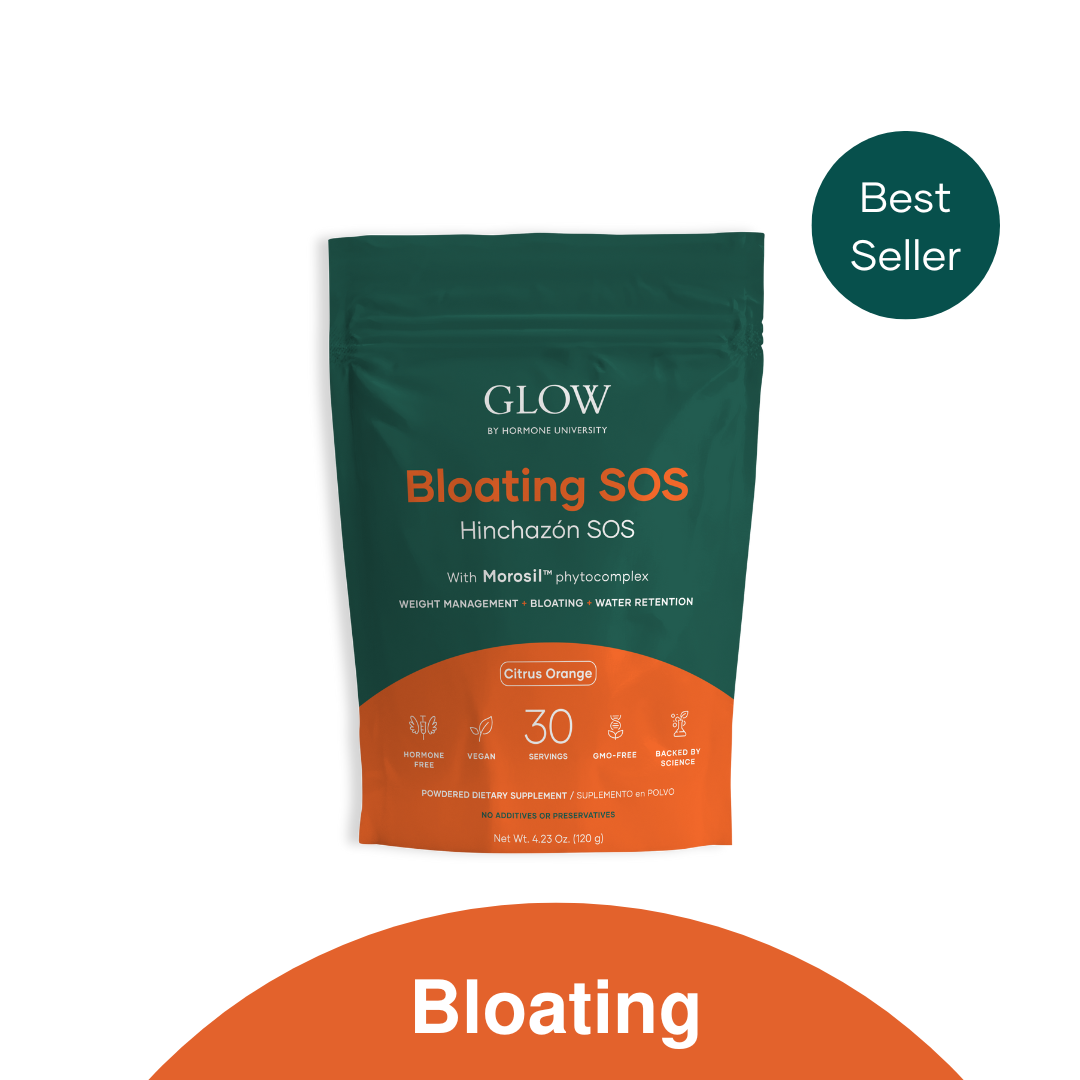TL;DR
• Vaginal pH balance should stay between 3.8-4.5; vitamins C, D, and E are crucial for maintaining this acidic environment
• Probiotics for vaginal health containing Lactobacillus strains are the most direct way to restore pH balance
• Hormonal fluctuations significantly impact pH; addressing hormones through targeted supplements provides lasting relief
• Topical applications like our Intimate Hydrator bypass digestive issues while delivering Vitamin E directly to tissues
• Combining vitamins with lifestyle changes provides the most effective approach to maintaining healthy pH
That uncomfortable feeling when something's "off" down there we understand how frustrating and isolating it can be. Vaginal pH balance is crucial for your comfort and health, yet it's rarely discussed openly. At Glow by Hormone University, co-developed with Dr. Elizabeth Poynor (PhD, OB-GYN), we believe knowledge empowers you to take control of your health.
Why Vitamins for Vaginal Health Matter
Your vaginal ecosystem relies on a delicate balance of bacteria, moisture, and pH levels. Vitamins for vaginal health support this balance by:
Key Functions: • Strengthening immune defenses against harmful bacteria • Supporting beneficial Lactobacilli growth • Maintaining healthy tissue and natural moisture • Regulating hormonal fluctuations that affect pH
The right vaginal health vitamins work at the cellular level, creating an environment where beneficial bacteria thrive while harmful organisms cannot survive.
Understanding pH Imbalance: Signs & Causes
|
Healthy pH Range |
Imbalanced pH |
Common Symptoms |
|
3.8-4.5 (acidic) |
Above 4.5 (less acidic) |
Unusual odor, discharge changes, itching, recurring infections |

Primary Causes of Imbalance:
-
Hormonal changes (menstruation, pregnancy, menopause)
-
Sexual activity (semen pH is 7.1-8)
-
Antibiotics disrupting beneficial bacteria
-
Poor diet lacking essential nutrients
-
Stress and inadequate sleep
Top 5 Vitamins for Optimal pH Balance
Comparison Table: Essential Vitamins for pH Balance
|
Vitamin |
Daily Dose |
Key Benefits |
Best For |
Food Sources |
|
Vitamin C |
250-500mg |
Supports Lactobacilli growth, immune function |
Preventing BV, boosting immunity |
Citrus, berries, peppers |
|
Vitamin D |
1000-2000 IU |
Reduces infection risk, regulates immune response |
Women with recurring infections |
Sunlight, fatty fish, fortified foods |
|
Vitamin E |
15mg (22.4 IU) |
Maintains tissue health, natural moisture |
Dryness, tissue repair |
Nuts, seeds, leafy greens |
|
B-Complex |
Varies by type |
Energy production, cellular health |
Overall wellness, energy |
Whole grains, eggs, legumes |
|
Vitamin A |
700mcg RAE |
Mucous membrane health |
Tissue integrity |
Sweet potatoes, carrots |
⚡ Pro Tip: Our Intimate Hydrator contains Vitamin E alongside Hyaluronic Acid and Collagen, delivering targeted nourishment directly to vaginal tissues—more effective than oral supplements alone.
Best Supplements & Probiotics Comparison
Decision Matrix: Choosing Your pH Support
|
Solution Type |
Effectiveness |
Speed |
Cost |
Best Candidate |
|
Oral Probiotics |
⭐⭐⭐ |
2-4 weeks |
$$ |
Mild imbalance, prevention |
|
Vaginal Probiotics |
⭐⭐⭐⭐⭐ |
1-2 weeks |
$$$ |
Active infections, severe imbalance |
|
Vitamin Supplements |
⭐⭐⭐ |
4-6 weeks |
$ |
Nutritional deficiencies |
|
Topical Solutions |
⭐⭐⭐⭐⭐ |
Immediate comfort |
$$ |
Dryness, tissue health |
|
Hormone Support |
⭐⭐⭐⭐⭐ |
2-6 weeks |
$$$ |
Hormonal imbalance root cause |
Best Probiotic Strains for pH:
• Lactobacillus crispatus (dominant in healthy vaginas)
• L. rhamnosus GR-1
• L. reuteri RC-14
• L. acidophilus
How to Choose Your pH Balance Solution
Decision Tree:
START: What's your primary concern?
│
├── Recurring infections → Combine probiotics + Vitamin C + D
│
├── Dryness/discomfort → Vitamin E + Intimate Hydrator
│
├── Hormonal fluctuations → Hormone-balancing support
│ └── During periods → Period SOS Cream
│ └── Menopause → Menopause SOS Cream
│
└── General maintenance → Daily multivitamin + lifestyle changes
Product Spotlight: Hormone-Safe Solutions
When vitamins alone aren't enough, targeted topical solutions address root causes:
Intimate Hydrator ($34.99) • Feature: Contains Vitamin E, Collagen, Hyaluronic Acid, Aloe • Benefit: Improves cells' ability to lubricate naturally, maintains healthy pH • Result: "This product has changed my life, making living comfortable again!" - Olivia C., Verified Buyer
Why Topical Beats Oral for Vaginal Health:
-
Direct absorption where needed
-
No digestive interference
-
Immediate comfort
-
No systemic side effects
For hormonal balance affecting pH:
Bloating SOS ($44.99) • Supports liver detoxification (processes excess hormones) • Digestive enzymes improve nutrient absorption • Dandelion reduces water retention • Many users report feeling relief within an hour
Start Your pH Balance Journey - Shop Now
Lifestyle Tips for Maintaining Balance
Daily Checklist for Optimal pH:
-
Hydrate with 8+ glasses of water
-
Include probiotic foods (yogurt, kefir, kimchi)
-
Wear breathable cotton underwear
-
Avoid douching or harsh soaps
-
Manage stress through movement or meditation
-
Support hormones with magnesium (try our Super Rich Magnesium Body Lotion)
Troubleshooting & When to See a Doctor
Common Issues & Solutions:
|
Problem |
Quick Fix |
Long-term Solution |
|
Fishy odor |
Vitamin C supplement |
Probiotics + pH testing |
|
Recurring yeast |
Reduce sugar intake |
Vitamin D + probiotics |
|
Dryness |
Intimate Hydrator |
Vitamin E + hormone support |
|
After antibiotics |
Immediate probiotics |
30-day probiotic protocol |
See a Doctor If:
• Symptoms persist beyond 2 weeks of treatment
• Unusual bleeding or severe pain
• Fever or systemic symptoms
• Multiple infections per year
FAQs
Q: What is a normal vaginal pH level?
Normal vaginal pH ranges from 3.8-4.5. This acidic environment protects against harmful bacteria and yeast overgrowth.
Q: Which vitamins support vaginal pH balance?
Vitamins C, D, and E are most critical. Vitamin C supports beneficial bacteria, D regulates immunity, and E maintains tissue health.
Q: How do I test my vaginal pH at home?
Use pH test strips designed for vaginal use. Test at the same cycle time monthly for consistency. Insert briefly, then compare color to the chart.
Q: Can diet affect vaginal pH?
Yes, significantly. Sugar feeds harmful bacteria, while probiotic foods support beneficial bacteria. Hydration also plays a crucial role.
Q: What causes vaginal pH imbalance?
Common causes include hormonal changes, sexual activity, antibiotics, douching, stress, and poor diet.
Q: Which probiotics are best for vaginal health?
Look for strains like L. crispatus, L. rhamnosus GR-1, and L. reuteri RC-14, with at least 10 billion CFUs.
Q; How do I restore vaginal pH naturally?
Combine probiotics, vitamin supplementation, hormone balance support, proper hydration, and avoid irritants.
Q: What are signs of vaginal pH imbalance?
Watch for unusual odor, discharge changes, itching, burning, recurring infections, or discomfort during intercourse.
Q: Can I use vitamins while pregnant?
Most vitamins are safe during pregnancy, but always consult your OB-GYN before starting new supplements.
Q: How long before I see results?
Topical solutions provide immediate comfort; oral supplements typically show results in 2-6 weeks with consistent use.







